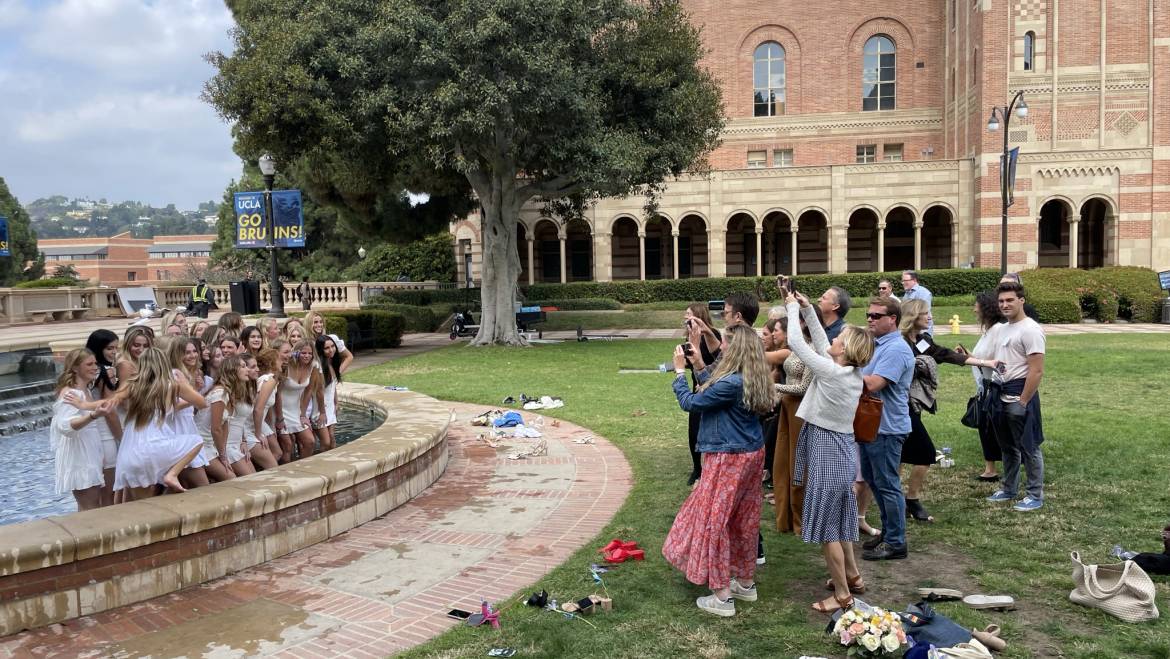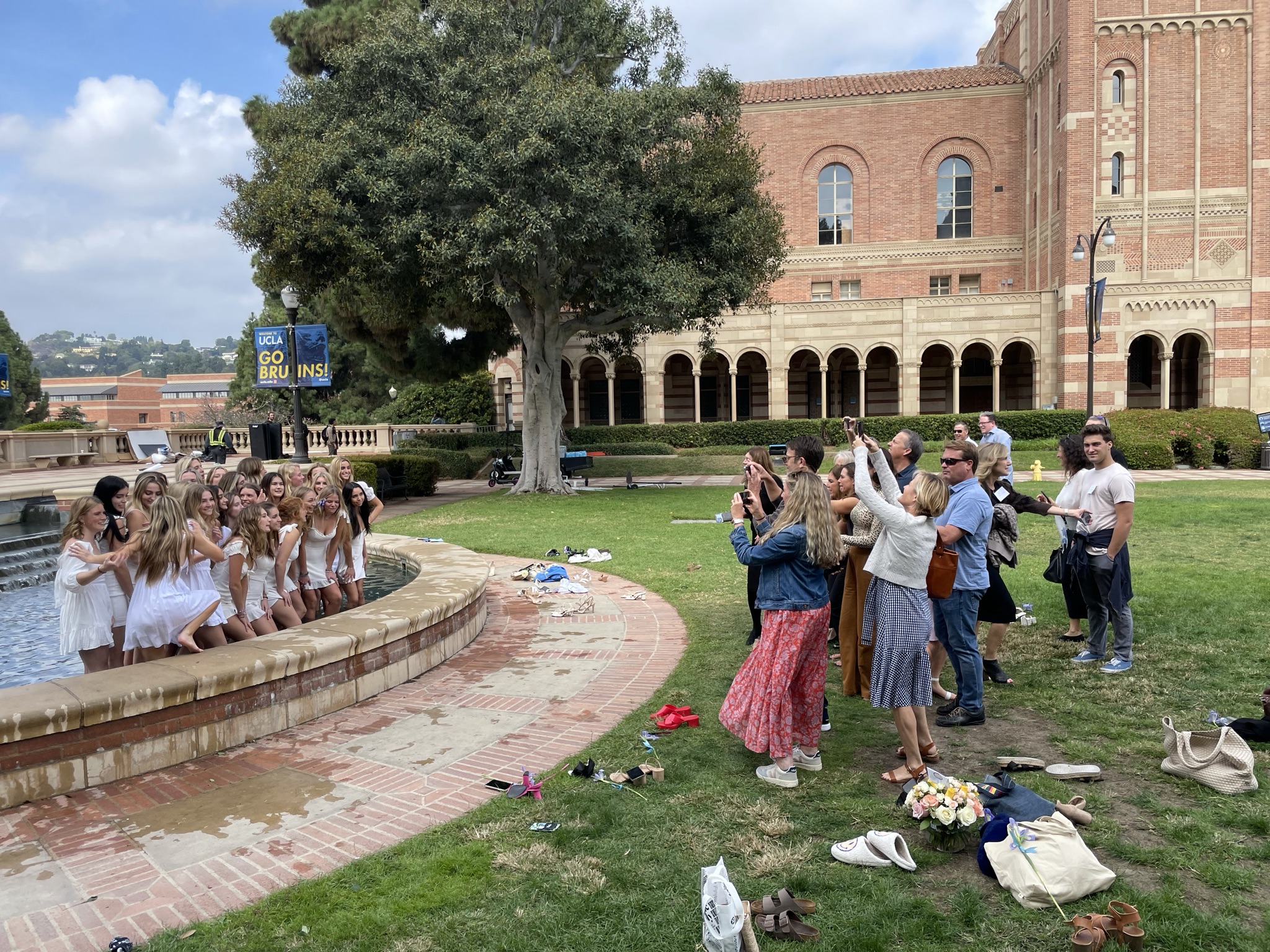
Wading in Shapiro Fountain counted among the chillier of the many activities of UCLA Parents’ Weekend
My daughter Lily left for UCLA in late September. I don’t know that she or any other first-year (the term “freshman,” I’ve picked up, being obsolete) will ever experience a month of such profound change of extended consequence.
Lily was a competitive figure skater. Her entire youth involved waking up gruesomely early on Saturday mornings. During the week, she cut out of Denver East High School at noon and headed to a rink 15 miles away to skate on weekday afternoons, making up the time with two Denver Online High School classes.
The initial idea was to make a go at Disney on Ice during a gap year. The pandemic and what turned out to be a stress fracture in her heel derailed that plan just as she got the nod from UCLA. Point being, the tyranny of ice-time availability means competitive figure skaters are not – cannot be – terribly social creatures. Add to this to the fact that, by the time her Saturday mornings freed up (and thus her Friday nights), she was a senior in high school, with access to a car, and her circle of friends remained a group of names whose faces I couldn’t for the most part have picked out of a lineup.
So that’s the background.
The notion of parents’ weekend (technically, UCLA Bruin Family Weekend) was not instinctively attractive to me. As a journalist, one learns to learn broadly based on one’s interests, amass targeted information as a particular story requires (and, typically, forget it all moments after the story posts/publishes), and attend extraneous lectures only when absolutely necessary. The parents’ weekend agenda, particularly on Friday (you’d think an elite institution would recognize Friday as a workday, but hey), was lecture-heavy. Plus my younger daughter, a high school second-year (a.k.a. sophomore) had her homecoming weekend here in Denver. I figured we’d head out to UCLA another weekend.
But then came an email from Kappa Kappa Gamma. Lily had rushed, and had really felt at home there, and was fortunate that her top choice had extended a bid. The Kappas recognized the traditional definition of “weekend.” There would be a tailgate prior to the UCLA-Oregon football game at the Rose Bowl on Saturday as well as the presentation of the new pledge class and a brunch on Sunday. This was much more my speed. Plus it would give me the opportunity to compare and contrast the Big House (Michigan Stadium) – where I had attended the Michigan-Washington game a month earlier – with the vaunted Rose Bowl.
I booked a flight that would get into LAX at like 9:30 p.m. on Friday and leave again at 8:20 p.m. on Sunday. Rental cars were not to be found below the $600-a-day range (all massive or sportscars, everything else being sold out). I would Uber. I was just getting into figuring out lodging when I decided to check in with my old friends Rob and Amy Ford.
The Fords lived across the alley from us in Denver’s Lowry neighborhood, the brownfield redevelopment of the eponymous former Air Force base. They had moved into a home of identical design that, over subsequent years, they did a notably better job of upgrading. I had recognized them as they unloaded into their garage in the summer of 2002: we had been in the same childbirth/how-to-change-a-diaper class at the Medical Center of Aurora some months before. Their daughter Laine was born a month before Lily in 2003.
They grew up together. Rob became my outdoor-recreation Sherpa, guiding me through the purchases of camping equipment and a mountain bike, items lowlanders from Dearborn, Michigan, whose grandparents had cottages Up North neither needed nor understood. As the kids hit preschool and I went freelance in 2008, Amy and I juggled kid-watching as the other hustled off to meetings or interviews. Lily and Laine became fast friends. Time passed; the Fords moved elsewhere in Denver; Laine was accepted to UCLA. She pledged Kappa Alpha Theta. It happens to be right next door to Kappa Kappa Gamma.
The Fords were also coming in on Friday, Amy said, and had yet to book a hotel. They’d stayed at the Sonder on Santa Monica Boulevard during move-in; she’d look there. Excellent, I said. One of like two rooms left was a bunk room – four bunks, she reported back. What do you think?
Let’s do it, I said. It’ll be very dormlike, and I’ll just split it with you.

Rob Ford in the Santa Monica Sonder hotel bunk room
I knocked on the door of Sonder room 326 at 11 p.m. on Friday night after bussing from a LAX terminal to the chaotic Uber/Lyft/taxi lot. Chase, their 16-year-old son whom I had held in the crook of my arm days after he was born – at 6’4”, he could pretty much do the same with me now – had one upper bunk; I took the other. The lights were soon out.
The morning I was up at 6:30 before the others. The lack of proximity of UCLA to the UCLA football team’s home stadium dictates a minimum-45-minute bus ride from campus to Pasadena’s most famous structure. The sheer number of buses required forces a two-round system. There are early buses and there are late buses. The Kappas – more accurately, host fraternity Sigma Chi – had the early buses this time. They would leave by 8 a.m. for a 12:30 p.m. kickoff.
The Uber from the hotel to the Sigma Chi house raced through the rain and past the 85,000 headstones of Los Angeles National Cemetery. The combination of their even spacing and our speed yielded mesmerizing, brain-teasing patterns that distilled themselves into a nonspatial realization: How many dead people there are! Even at 52, more than halfway through this game, it’s hard to fathom that everyone, no matter how young, dynamic, and energetic, will end up there or somewhere similar or as puffs of thermally liberated organic gases.

Los Angeles National Cemetery (courtesy of TripAdvisor)
I had not been in a fraternity house since I left my own in 1991. While functionally superior to the Delta Kappa Epsilon house on 1004 Olivia Street in Ann Arbor (much more outdoor space, wisely walled-in), this was much the same deal. There were tile floors – the same tile as we put in our kids’ bathroom a few years back after the linoleum started to unroll itself – rather than well-worn hardwood, a solid choice. I recalled mopping our Deke floors as a pledge groggy on four hours of sleep and noting that the floor was drinking in the water as it had the beer. The big difference here was the presence of several brightly painted beer pong tables. While beer pong existed then, the specialized furniture had yet to catch on.

The UCLA Sigma Chi courtyard
I had a warm mimosa for breakfast as I chatted with a Sigma Chi dad who had kindly chosen to wear a sweatshirt with a University of Michigan block M, providing a familiar touchstone in otherwise foreign territory. He lives in Seattle now, having graduated from Michigan Law in 1993. I realized after this and a couple of other conversations that the parents of college kids are all more or less the same age. I also realized that the parents of college kids who decide to rush fraternities and sororities – social clubs for social people, by and large – tend to be engaging conversationalists.
Lily appeared with a couple of friends before I’d drunk my breakfast. She carried two Target bags. One contained her UCLA hat and a six pack of Bud Light tall boys. The other held a twelve of Truly hard seltzer.
I had been reminded in Ann Arbor of the importance of having beer or similar available during an extended tailgate, and had, as I bussed to the Uber at LAX, suggested that Lily work on procuring such on my to-be-Venmoed tab. She had come through, the purchasing having involved a friend of a friend and a Bird scooter (the verb, one of three I learned over the weekend, being “to bird”).
Lily being 18, this was an illegal purchase, and one catalyzed by what can only be characterized as questionable – if not outright awful – parenting. But I have been a high school exchange student (Germany) and a freshman (first-year) in college. There’s no point in pretending the universally flouted U.S. drinking age makes any sense at all. Plus it was tailgate, for crissakes.
Lily was talkative, excitedly covering math and chem tests to social activities (many). She and apparently two thirds of the UCLA student body was on antibiotics to fight what had earned the moniker of “Frat Flu.” She introduced me to friend after friend: “<friend>, this is my dad,” and with what I considered superb enthusiasm. Friend after friend made a marvelously convincing show of being interested in meeting a 52-year-old man with a nose reddened by the topical-chemotherapy treatment of actinic keratosis and whose genetic material and guidance had happened to contribute, however marginally, to the creation and development of the introducer.

The Fall 1988 Michigan DKE pledge class
They’re just kids. They just met a month ago. But I thought about a group text I’m on. It consists of 10 or so 51 and 52-year-olds. We live all over the country. The conversation flares up occasionally, typically on the occasion of a birthday or a Michigan sports event of some note (March Madness; the Michigan-Michigan State football game). Often, the banter makes me laugh out loud, and we share trivialities such how certain songs (“Welcome to the Jungle”; “Uptown Girl”) still make us chuckle because of forced-memorization parodies more than three decades past. These were pledge brothers of mine.
The criticisms of the Greek system have their saliency. You buy your friends. It’s exclusionary. Fair enough. My younger daughter, skeptical of sororities, has said as much. My responses: I’m friends with Rob Ford because he moved in across the alley. I met your mom because we got assigned to a project in Germany. Your friends are the result of randomness. Fraternities and sororities are merely a filter that tightens the tails of the bell curve. And guess what? Life is exclusionary. There are gay bars; there are biker bars; there are country clubs. Not all decide enter; not all can. Get used to it.
My mom (Chi Omega, Michigan State, ’63) still gets together with sorority sisters every year over the holidays. More than once at the Sigma Chi house and at the golf-course tailgate thereafter, as Lily introduced me to friend after friend, I thought to myself, My god, Lily, these kids you just met – you’re going to be friends with them long after I’m but a puff of carbon.
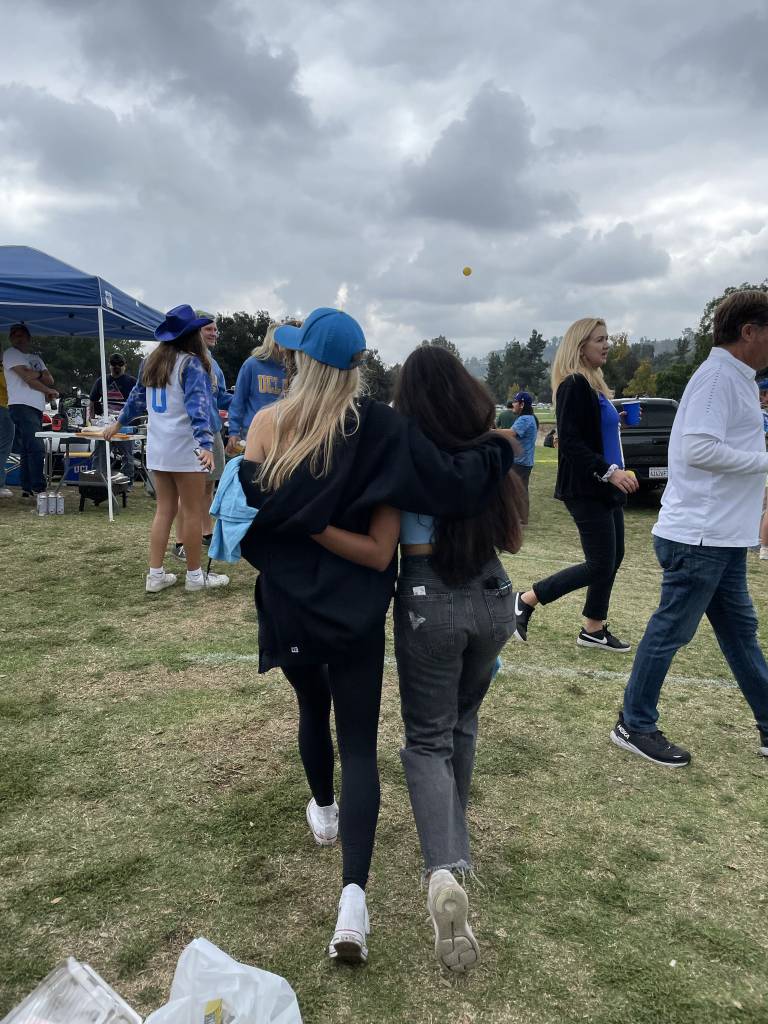
Met last month; friends forever.
So yes, we tailgated. Lily disappeared to the tailgates of other fraternities (SAE, Sigma Nu) with which the Kappas have “thrown.” (This my second new verb; it means “to party.” My third new verb was “to grind,” which means “to study” or “to work out hard.” Rob and I joked that this term had a somewhat different meaning back in the day.) She then reappeared, often with her plastic cup filled with a new hard seltzer, her Truly procurement having been donated or pilfered by the less-enterprising masses.
This post won’t make it to Sunday, to the brunch at the Kappa house where 70 pledges, told to dress in white to contrast with the actives’ black, were introduced in a home that otherwise might have been the domain of a studio-era Hollywood actress. Beautifully appointed, immaculately put together, clean – essentially the diametric opposite of Sigma Chi and every other fraternity house in the United States. The actives introducing and the pledges being introduced were all young and lovely in their own ways, but mostly they were impressive, studying neuroscience to math to econ to dance. One of Lily’s best pals, not (yet) a Kappa, is hell bent on becoming an orthopedic surgeon. She scored a 1570 on her SAT. Got one question wrong. You’d never know it based on how she acts. UCLA, like Michigan, has no dearth of such people. They are our future.
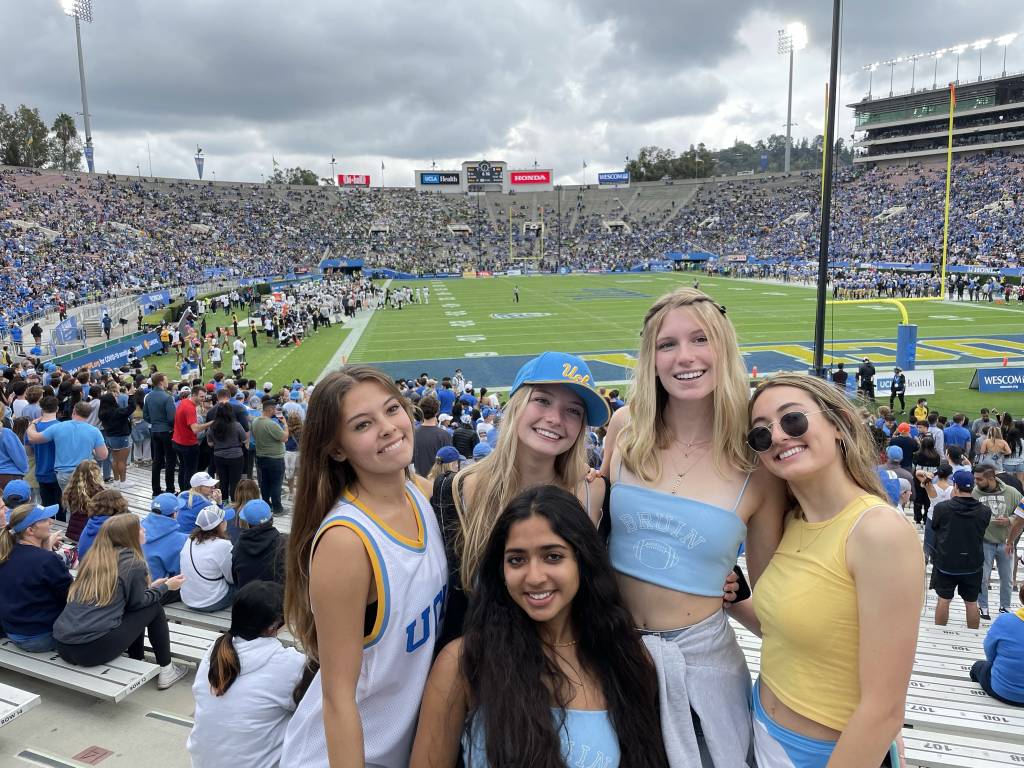
First-years not particularly watching the game at the Rose Bowl
Finally, and objectively speaking, the Rose Bowl is no Big House. Surely the need to bus or drive close to – or, depending on traffic, much more than – an hour one-way is a deterrent to the sellouts that have been pretty much forever standard at Michigan Stadium. The long media-timeout breaks dragged on as, unlike at Michigan, you didn’t have the entire stadium singing “Mr. Brightside,” “Don’t Stop Believin’,” “Sweet Caroline,” and other mainstays. The UCLA fight song lacks the oomph of “Hail to the Victors,” and there is no equivalent to the “Let’s Go Blue” interstitial. Michigan Football – and the same probably holds for Ohio State, Penn State and other Big 10 midwestern football experiences – is “religion” not because there’s anything actually being worshipped, but because it provides a mass-scale common ground upon which the theologically inclined and the atheistic, the Democrat and Republican, can together dance, chant, and sing. It’s deeply energizing, and it elevates the spirit even as it deprecates the liver.
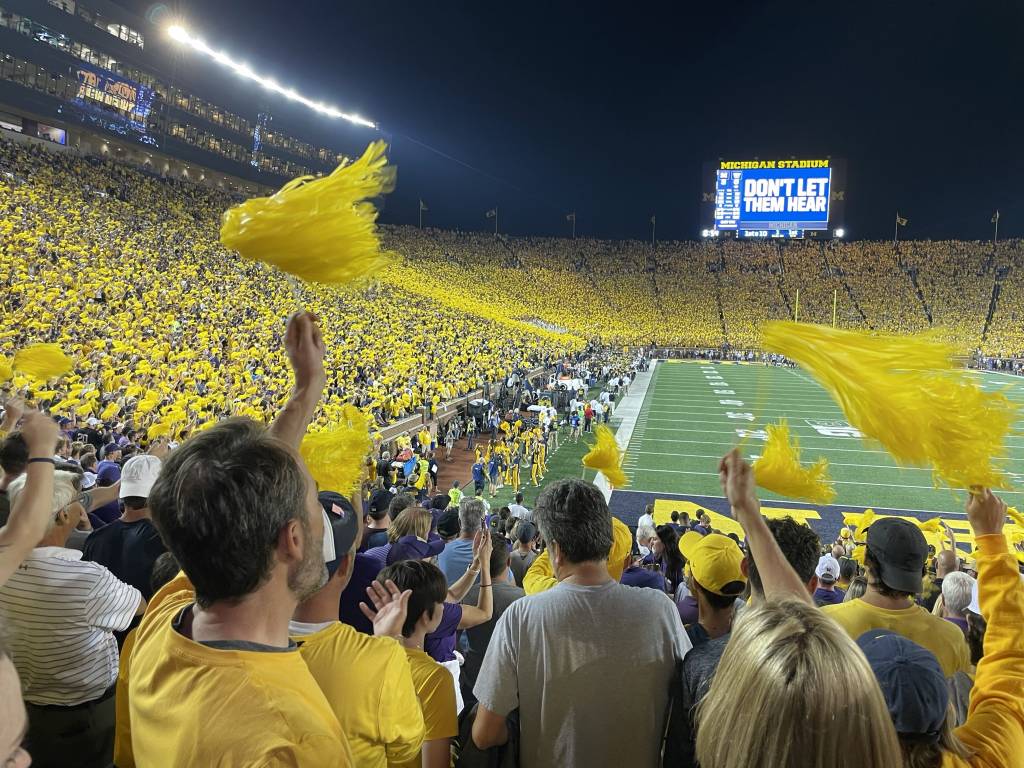
A somewhat different scene at the Big House on Sept. 11, 2021.
But then, the comparative shortcomings of the Rose Bowl experience didn’t matter. The girls were there for the tailgate and the hanging out, and declared that it was time to go early in the third quarter. As we bounced about in the back of school bus on the way back, I had the game on my phone (YouTube TV) when UCLA’s final drive ended with an interception (34-31 Oregon). A handful of Sigma Nus chatting with Lily, Laine, and a couple of other girls followed along. These guys reminded me of the fellas on that group text and demonstrated that, while men in their late teens and early twenties (and, perhaps, their early fifties) still have some emotional developing to do, their senses of humor are fully formed.
I came away from UCLA parents’ weekend feeling good about my daughter, her many friends, and the university she’s chosen – and feeling just a little bit younger myself.

